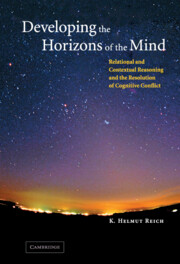 Developing the Horizons of the Mind
Developing the Horizons of the Mind Book contents
- Frontmatter
- Contents
- List of figures
- List of tables
- Acknowledgements
- Introduction
- Part I The Theory of Relational and Contextual Reasoning (RCR) and its Empirical Study
- 1 Introduction
- 2 Development of RCR
- 3 Metaphysical Assumptions and Theory of RCR
- 4 Empirical Studies of RCR
- 5 Other Thought Forms and Matching Them to the Problem at Hand
- Part II Applications of RCR
- Appendix 1 Interviewing techniques
- Appendix 2 Scoring manual for RCR
- References
- Index
3 - Metaphysical Assumptions and Theory of RCR
Published online by Cambridge University Press: 22 September 2009
- Frontmatter
- Contents
- List of figures
- List of tables
- Acknowledgements
- Introduction
- Part I The Theory of Relational and Contextual Reasoning (RCR) and its Empirical Study
- 1 Introduction
- 2 Development of RCR
- 3 Metaphysical Assumptions and Theory of RCR
- 4 Empirical Studies of RCR
- 5 Other Thought Forms and Matching Them to the Problem at Hand
- Part II Applications of RCR
- Appendix 1 Interviewing techniques
- Appendix 2 Scoring manual for RCR
- References
- Index
Summary
RCR implies a certain ontology, that is, it makes assumptions about the nature of reality. RCR also involves epistemological assumptions, those having to do with the process of gaining knowledge in the cases concerned. For these reasons, I begin with assumptions adopted here from the philosophy of knowledge. I continue with a philosophical analysis of RCR as thought form. Finally, there is a discussion of, and an attempt at justifying, the underlying logic.
Assumptions adopted from the philosophy of knowledge
Why a discussion of the philosophical foundations of the work described in this monograph? Throughout some kind of reality is assumed to exist ‘out there’. That is not undisputed, and needs clarification and justification. In the words of Hilary Putnam (1999, p. 4): ‘And no issue polarises the humanities – and, increasingly the arts as well – as much as realism, described as “logocentrism” by one side and as the “defence of the idea of objective knowledge” by the other.’ Putnam's solution – and largely mine – is a ‘middle way between reactionary metaphysics and irresponsible relativism’ (ibid., p. 5).
Options
In view of the importance of the assumptive base for one's research (Werner [1948] 1973, 1957; Reese and Overton 1970; Overton and Reese 1972; Case 1998, pp. 747–53; Putnam 1999; Fahrenberg and Cheetham 2000), I state my position (Reich 1995c, 2000b) after reviewing some options.
Information
- Type
- Chapter
- Information
- Developing the Horizons of the MindRelational and Contextual Reasoning and the Resolution of Cognitive Conflict, pp. 35 - 46Publisher: Cambridge University PressPrint publication year: 2002